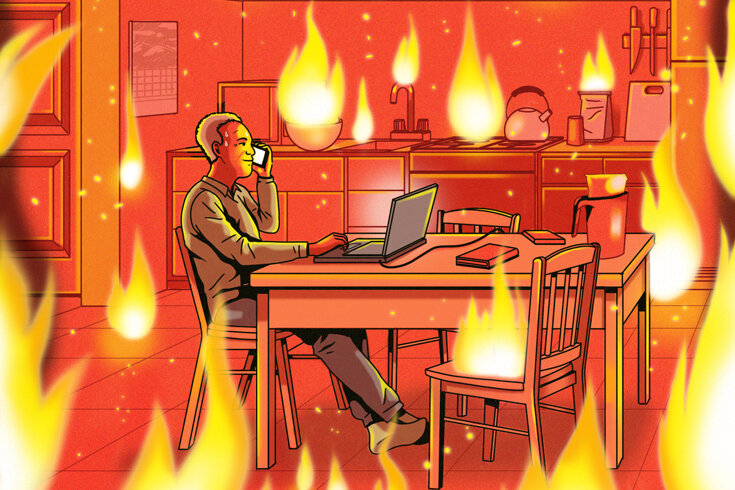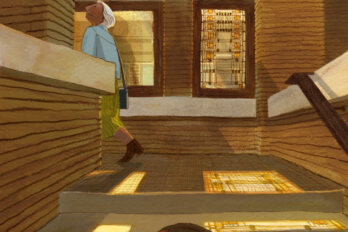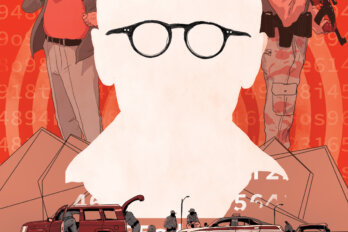Listen to an audio version of this story
For more audio from The Walrus, subscribe to AMI-audio podcasts on iTunes.
Some indeterminate day last fall, back from my biweekly masked trudge to the grocery store, I arrive home to a letter from the Canada Revenue Agency. They want proof that my income in 2019 was greater than $5,000 to confirm eligibility for CERB payments I received over the summer.
The Canada Emergency Response Benefit was a sensible, wide-ranging backstop, shoring up the livelihoods of those who found themselves struggling in a suddenly frozen economy. Rolled out quickly and efficiently last March and run on an honour system, CERB allowed anyone facing loss of income because of COVID-19 to go online, check a few boxes confirming eligibility, and receive $2,000 in monthly assistance. I put in a call to the CRA in September, inquiring after one of these cheques that had gone missing.
A phone number is included in the letter, and I call it. With my bank account well into an uncontrolled dive, I’m on hold, waiting to speak with one of the more than 44,000 personnel who make up the largest apparatus of the federal public service, its average budget a nose over $5 billion in pursuit of around $430 billion in annual tax revenue. It’s a leviathan. I’m krill. After thirty minutes, I’m talking to a perfunctory but nonthreatening CRA agent, Barney. (Agents, supervisors, and managers all offer their names on contact, I’ll come to learn.)
Barney seems eager to help with my case and be on his way—bigger fish, a man about a deduction. It should be straightforward. In 2019, I was one of the Canadian writers who got lucky with a $25,000 arts-production grant, an award of taxable income to help with subsistence while working on an ongoing project. The grant represented the largest portion of what I’d made that year. The CRA’s online portal listed types of income and/or situations that would be ineligible for CERB. “Arts-production grants” didn’t appear.
I’m now sitting cross-legged on my floor, the central stamen in an array of splayed-petal papers. “So this one will work? The T4A?” “From the arts council grant? Yes, that’ll work. Upload that.” That was my first, cataclysmic mistake. Doing what I was told. On the day I was told to do it.
Lockdown last March exploded everyone’s sense of the future’s relative predictability. Yes, the sun kept coming up, but over the never seen before. It hit everyone hard psychologically and some harder materially: the underemployed, the working poor, the self-employed, the “precariat.” As happens for writers, I was already having a thin year. Now, COVID-19. My course at the University of Toronto’s school of continuing studies was cancelled. Three residency/fellowship opportunities: cancelled. My upcoming book: bumped from spring to fall. Prospects looked grim.
I’m living in a one-and-a-half-bedroom, the cheapest rental I could find within my son’s school catchment in Toronto. With me half the time, in his half bedroom, he’s been Zenishly uncomplaining throughout this upheaval, as though he’s seen pandemics before. If we’re going by the usual metric advising we allocate no more than 30 percent of our income to housing, I’d need to be in or around the $65,000 bracket. I don’t come within astral-projecting distance of that. Can renters be house poor? Bottom line: priced out of Toronto, I remain in Toronto. It’s where my son is. Operating in the red for years, I’ve tried plotting my way through to his eighteenth birthday—it doesn’t add up.
Listen to an audio version of this story
For more audio from The Walrus, subscribe to AMI-audio podcasts on iTunes.
We scraped through summer propped up by CERB. For me, $2,000 a month amounts almost precisely to rent, internet, phone. No food. I was trying to leapfrog the worst of it by aiming for fall, resorting to long gambles and blind hope. A news snippet caught on a loud radio: “Construction remains ongoing,” and I’m regretting not having done my apprenticeship during the years I worked with builders in Dublin. I’d be working now. Or, had I managed to stay in university somehow, I’d be still working.
These, though, are counterfactual hypotheses, of interest to dodgy historians and judgmental deities. To get a university job in creative writing, one needs a postgraduate degree in creative writing. I have six collections of poetry and a high school diploma. At fifty-plus, I’m a tough case for an employment adviser.
I work on new ways with lentils while I wait for my proof of income to be approved and my eligibility for CERB confirmed. I pick up applications for employment from the LCBO, Loblaws, hospitals; I know how to unload trucks. Given a chance, I’m a dab hand at stacking boxes. Another letter arrives: the validators—like Klamm in Kafka’s The Castle, CRA validators have never been seen or spoken to by a human being not employed by the CRA and never will be. They have examined my T4A and declared me ineligible for CERB or for the Canada Recovery Benefit (CRB). Furthermore, I must pay back whatever emergency assistance I have until now received—a cool $10,000. No explanation. No phone number.
Over the next sixty days, I spend upward of twenty hours on the phone, my voice crumbling, rising, clinging to civility while trying to respond to what I come to understand is a classic double bind. During crisis, authority offers assistance. Assistance delivered, authority demands proof of eligibility for what has been claimed in good faith. Authority withdraws assistance until proof is delivered. Upon delivery of proof, authority declares proof nonproof, continues to withhold assistance, and exacts penalty, causing crisis. There is no exit. One cannot negotiate escape from a logically impossible demand enacted by the CRA. It’s why they compare taxes to death.
The exchanges I have with agents, supervisors, and managers based in St. John’s, Sudbury, Ottawa, Surrey, and (for all I know) somewhere in my own building verge at times on psychological warfare: evasive, irrational, nonsensical, suspicious, blatantly wrong. I’m learning shades of despair I never knew existed. My son has previously seen me cry; he’s never seen me cry, laugh, and pull my hair while insisting into my phone that the supervisor tell the validators to make headquarters call the minister of national revenue because you are acting in contravention of Canadian tax law! (I was beginning to sound unstable even to myself.)
I haven’t been able to make rent. The eviction notices arrive midmonth, each month, and increase in threat level. Explaining one of these letters to a visibly concerned twelve-year-old is suboptimal, as a parent. Agreeing with said twelve-year-old that Christmas will be unavoidably postponed is also, as a parent, suboptimal. He calls me “an utter plank,” which I take to mean love in the argot of the young, and we hug a lot. He also asks permission to remain in his quarters when next I find myself “in discussion” with a CRA agent. “Granted,” I say.
I didn’t have the wherewithal to record the hours and hours of phone exchanges. The best-of reel is burned in memory, though, and I could recite ten of the most flamboyantly unreal.
CRA supervisor: “It’s possible that, whatever an ‘arts-production grant’ is, it isn’t distinguishable from those other forms of income that are not eligible. Bursaries, fellowships, scholarships, they’re not eligible.”
KB: “Grants are distinguishable. They’re so distinguishable, they’ve been distinguished in the Canadian tax code under the heading ‘Arts Production Grants.’”
CRA: “That may well be, but—”
KB: “Can I ask if you’ve read the Canadian tax code?”
CRA: “Of course not.”
KB: “I have it right here. May I read you the paragraph I’m talking about?”
CRA: “No.”
KB: “Can I email it to you?”
CRA: “No.”
KB: “Have the validators read the Canadian tax code?”
CRA: “You’d have to ask the validators.”
KB: “Has anyone at the CRA read the Canadian tax code?”
CRA: “How would I know that?”
When not on hold, or being redirected, or misdirected, or calling back, or awaiting a call back, I’m now also compiling a second dossier, then a third. The pre-assessment department—acting independently of the CERB/CRB department and unconnected to the department handling the Canada Child Benefit—has also written, requiring proof of my son’s existence. He’s been dividing his time equally between his parents since 2015 but is also now, apparently, a locus of potential fraud. It’s common, I’m told, for people to invent dependents who don’t exist. You know, to make up children. Affidavits, birth certificate, letters from school principals and soccer coaches, passport, signed statements from people who know us but aren’t family. Tax return, Canada Child Benefit, and CERB/CRB are all now concurrently log-jammed in disparate, sclerotic, balkanized departments of the CRA, none apparently speaking to the others, all cut off from their peers and superiors, their superiors’ superiors. Mass-trawling, dragging the sea floor for the scavenger fish conspiring to push federal coffers to the brink of insolvency with their arts grants and make-believe babies.
I’ve collected statements from the Canada Council for the Arts, the Toronto Arts Council, the Writers’ Trust, The Writers’ Union of Canada, and my MP’s office confirming that, yes, my understanding that arts-production grants are CERB-eligible income is correct. There was even a meeting earlier in December: this issue, along with other more contentious ones, has been sorted out and settled.
The agents I speak to know of no meeting. They sound put out at not having been invited. I speak to my accountant. She’s written a “white paper,” she says, on the very subject of arts-production grants. She identifies for me a bulletin—IT-257R—that clarifies their legal standing. Another thirty minutes on hold, and the next supervisor will not allow me to identify IT-257R. I try saying it faster, “Eyeteetoofysenner!” He’s talking over me. I could be identifying a red dwarf in the Andromeda Galaxy or a gene responsible for the putting of fists through drywall. I have $80 and change. In the world. And no—What’s it called?—support network. I’ve been of “no fixed address” before. I’ve never yet been homeless.
I take to Twitter. I mean, I was already on Twitter, but my tendencies there leaned toward gnomic one-liners and photos of unwashed kitchenware claiming to be NASA images of cosmic wonders. Until now. Now, I am campaigning. I’m tagging blue checkmarks, @-ing influential accounts in the Twittersphere who may, what, look away from the rending of the social fabric south of the border to notice I was . . . in trouble?
Reader, they noticed. I got notifications, responses, retweets, and DMs. I heard from other artists in the same position. I heard, again, from the unions and the arts councils and MPs, and from a policy adviser to the minister of national revenue. I was now so emboldened (and so very afraid) that I @-ed a journalist. She listened, asked for documents, went elsewhere for context, and the story appeared two days later, my accompanying headshot credited to my son.
Within forty-eight hours of the piece in the Globe and Mail, I got a call from CRA HQ: the disarmingly communicative Frieda, sounding prepared and a bit lawyerly, with a message of contrition. Things were in flux, policy-wise. Administration of initiatives always contains wrinkles, and if an agent had been misinformed, she was sorry. She was. The decision had been reversed, in fact, in my case, now that they’d seen the bigger picture and acquired requisite information, but that’s not to say they hadn’t, sadly, had cases of fraud elsewhere, sadly. I’d be receiving a letter confirming my eligibility, reimbursing me for stopped payments, and also my tax return was finished, and, you understand . . .
Now, imagine encountering a CRA “wrinkle” in other circumstances. If I were a mother of three, shared this apartment with extended family, worked in food processing or transport or cleaning or long-term care. If I didn’t know anyone in publishing, media, or the arts. If I’d not had hours to spend on the phone. What choice but to cut one’s losses and roll over, whatever the cost?




